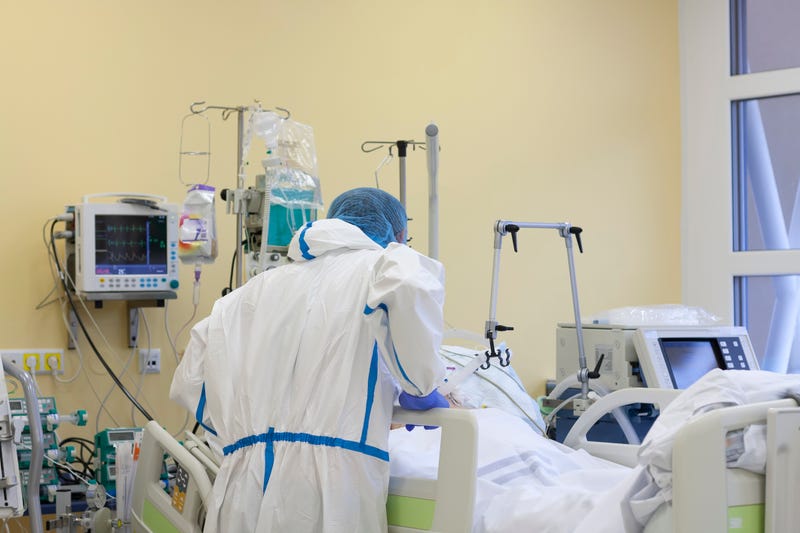
CHICAGO (WBBM NEWSRADIO) -- COVID-19 hospitalizations in Illinois, the vast majority among the unvaccinated, are threatening to overwhelm hospitals in some parts of the state.
“Hospital staff are becoming overwhelmed and overburdened,” said Governor Pritzker on Thursday at a COVID-19 update, while also announcing a new, indoor mask mandate. “People are dying who don’t have to die.”
From January through July, 97 percent of COVID-19 cases in Illinois were among unvaccinated people, Pritzker said, and 96 percent of hospitalizations were among unvaccinated people. Additionally, 95 percent of COVD-19 deaths among unvaccinated people.
"You don't need to be an epidemiologist to understand what is going on here: This is a pandemic of the unvaccinated. These are preventable deaths, and beyond the tragedy of losing lives for no reason, this also means inflicting serious damage on communities. That's because the regions with the lowest vaccination rates, are the regions where there are fewer hospitals and lower hospital capacity; and those hospitals are sometimes the least well-equipped to handle cases as they become more acute," Pritzker said.
In southern and east central Illinois, fewer than half of residents are fully vaccinated, compared with over 70 percent in suburban Cook County.
On Thursday, the seven-day rolling average for ICU bed availability in southern Illinois is three percent.
"During spring surge, the lowest ICU bed availability anywhere in the state never dropped below 15 percent," Pritzker said.
Illinois Department of Public Health Director Dr. Ngozi Ezike said Thursday, "as of last night, 2,184 individuals in Illinois were reported to be in the hospital with COVID-19; and of those, 489 were in the ICU, and 241 were on ventilators...
"I was hoping we'd never have to be here again. But right now, we're seeing 220 individuals being admitted to the hospital every day with COVID. The last time we saw this high a number was in May. Cases reported today are more than 40 times higher than the low that we appreciated earlier this summer. We are facing ICU hospital shortages. The ICU beds have run out, particularly in southern Illinois and parts of central Illinois, where the vaccination rates are the lowest."
She said in Region 5, Southern Illinois, is least-vaccinated, there was only one ICU bed available on Tuesday.
"That's not just one ICU bed for a COVID patient. That's one ICU bed in the entire region for the 20 counties that it serves for anyone — whether it's appendicitis, a car crash, any kind of injury that would need a bed," Dr. Ezike said.
Pritzker added: “I’m sure that if people understood that being unvaccinated could take a hospital bed from an accident victim, they might go get vaccinated. Unfortunately, we are running out of time as our hospitals run out of beds.”
Most hospitals in different areas of the state are reaching capacity, as well, she said.
"At the rate we are going, Region 5 will not have any ICU beds as soon as tomorrow. And potentially next week for Region 4. Regions 3 and 6 could run out of ICU beds in mid-September, if the number of people being admitted to the hospital everyday continues at its current rate," Dr. Ezike said.
Additionally, the State of Illinois is short on healthcare workers.
“Because of the Delta variant, hospitals are again fighting the battle we had hoped would be behind us by now,” Pritzker said. “I can’t begin to imagine how frustrating this must be for them.”
"Our poor healthcare workers have been in this stressful work environment for a year and half, and they are tired and somewhat frustrated, because we do have the tools that will help keep people out of the hospital," Dr. Ezike added.
Both Governor Pritzker and Dr. Ezike urged people to get fully vaccinated and to wear masks to slow the spread of COVID-19.
"Let's be clear: Vaccination is the most effective tool we have for keeping people out of the hospital and preventing deaths," Pritzker said.
Ezike agreed that vaccination is our tool. On Monday, the FDA approved the Pfizer COVID-19 vaccine for everyone 16 years and up.
"For people who are hesitant because the vaccine had 'not yet been approved' or was 'experimental', that excuse is gone. I urge you now to go and get vaccinated," Dr. Ezike said. "FDA's full approval of the COVID-19 vaccine, after tens of thousands of clinical trial participants and months of real-world data, should help reassure everyone who has concerns about getting vaccinated."
But let's not forget the other effective tool, Dr. Ezike said, that we had before we had vaccines: masks.
"Wearing a mask continues to be one of the simplest, cheapest ways to reduce the spread of COVID-19," she said. "And there is robust, scientific evidence that widespread use of masks, including non-medical masks, do in fact prevent the spread of COVID-19.
"The bottom line is masks are effective. Vaccines are effective," Dr. Ezike said. "But until more people are vaccinated, we need to take the steps to protect our health care workers, protect our hospital resources, and protect our most vulnerable."





